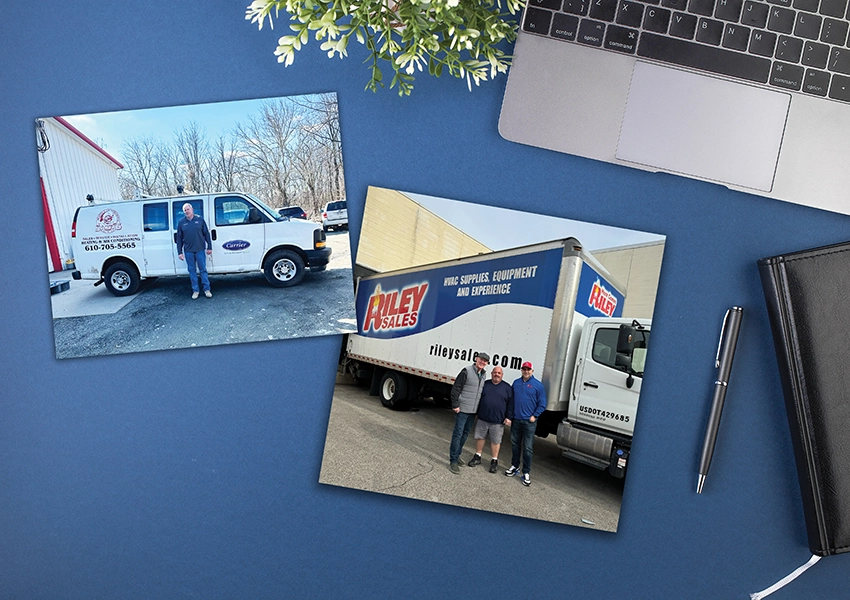As HVACR Business’s Tops In Trucks Fleet Design Contest approaches, we chatted with contractor Joe Santacroce, owner of Douglassville, PA-based Santa’s Heating and Air Conditioning, and distributor Mike Riley, owner of Plymouth Meeting, PA-based Riley Sales.
Both serve the Greater Philadelphia area, including parts of Delaware and across the river into New Jersey.
Santacroce has more than four decades of experience and began his business with a few helpers. Nearing retirement age of 70, Santacroce now has 60 employees and operates about 20 trucks. “We focus on multifamily new construction projects, which is about 75% of our business,” Santacroce said. “I know that being reliable and efficient when serving our clients is extremely important, and our fleet is the backbone of our transportation needs.”
These service vehicles traverse an area of approximately 50 to 60 miles daily. Though he doesn’t have a formal maintenance program, Joe trusts his chief mechanic and techs to maintain the vehicles’ upkeep.
He allows the techs to take their vehicle home, reducing travel time to get to the first job every morning. He uses an electric card system and GPS tracking software to keep track of the vehicles in order to maintain accountability over his team members. He also streamlines operations with an electronic service tool that systematically tracks and efficiently processes payments.
The one major difference from some contractors in handling his fleet is that Santacroce buys almost all of the vehicles.
“I hate debt,” he said emphatically, emphasizing his decision to buy rather than lease.
“We’re about to celebrate 40 years in business, and as we’ve grown, this approach has worked well for us,” he said. Noting that a succession plan is in place, and with his approaching retirement, the company will become an employee stock ownership plan (ESOP).
Would he change anything regarding his fleet usage?
“Sure, maybe we could create a system for a tighter maintenance schedule for the fleet, and in that sense, there’s always room for improvement,” he said. “But our approach with our techs, who are conscientious about the vehicles, has allowed us to grow as a company.”
Mike Riley generally has full maintenance leases on his vehicles, unlike his friend, Joe Santacroce. Riley admits it’s a permanent pain point because you pay forever. But he also says he doesn’t have to lose time or become overwhelmed with maintenance issues. Riley, who took over the business from his father, Tom, has 28 vehicles, including trucks, box trucks and pickups.
“Every wholesaler has issues with his fleet, and it begins with maintenance,” Riley said. “It’s not glamorous work, but those basic maintenance tasks are important, especially for the diesel trucks because they require special fluids.” By having full-service leases with most of his vehicles, they can replace one almost immediately if it breaks down.
“No one likes reoccurring costs, but by leasing my vehicles, I can concentrate on my core operation and leave the upkeep and replacement issues to my leasing partner.”
Riley says his approach to the fleet is to lease them initially and then consider a buyout based on the performance and reliability of each vehicle. “You have to sit down and evaluate the cost-effectiveness of each option,” he said.
Riley also says some distributors, like himself, have strong personal connections, which allow for favorable leasing deals. “You still can’t get away from the personal element in some business transactions, and if you don’t have one on the leasing side, you should consider trying to create one.”
Delivery reliability is paramount, as reflected in the company’s willingness to drop off supplies to contractors on the job site, especially when they unexpectedly realize they need a part, according to Riley. “We’ll get into one of our trucks and deliver right to them, and we can only make the promise if we have confidence in our fleet,” Riley said.
Riley uses large decals on all his trucks. He says it increases visibility but also reinforces Riley Sales' professionalism and reliability in customers' eyes.
Santacroce and Riley agree that when examining one of the major fleet issues – buy or lease – it comes down to a company’s grip on cost versus convenience. Regardless of the choice, they both say you must have the reliability to meet your customers’ expectations.
Tom Perić is the editor of HVACR Business magazine.





